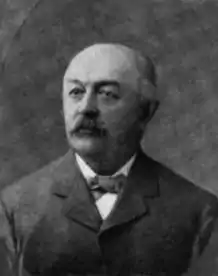Walter L. Brown
Walter Livingstone Brown (September 5, 1846 – February 3, 1924) was an American politician from New York.
Walter L. Brown | |
|---|---|
 Brown in 1903 | |
| Member of the New York Senate from the 33rd district | |
| In office January 1, 1896 – December 31, 1898 | |
| Preceded by | New district |
| Succeeded by | James D. Feeter |
| In office January 1, 1903 – December 31, 1906 | |
| Preceded by | James D. Feeter |
| Succeeded by | Seth G. Heacock |
| Member of the New York Assembly | |
| In office January 1, 1888 – December 31, 1889 | |
| Preceded by | Frank B. Arnold |
| Succeeded by | Nathan Bridges |
| Constituency | 2nd Otsego |
| In office January 1, 1891 – December 31, 1893 | |
| Preceded by | Nathan Bridges |
| Succeeded by | John J. Rider |
| Constituency | 2nd Otsego (1891–1892) Otsego (1893) |
| Personal details | |
| Born | September 5, 1846 Carlisle, New York |
| Died | February 3, 1924 (aged 77) Montebello, California |
Life
Born in Carlisle, Schoharie County, New York, Brown attended the common schools. In 1868, he removed to Albany where he worked in a hardware store. In 1872, he removed to Oneonta and opened there his own hardware store. He also engaged in dairy farming. He served five years as the First-Lieutenant of the Third Separate Company of the New York National Guard.
He was Supervisor of the Town of Oneonta from 1882 to 1888; and a member of the New York State Assembly in 1888, 1889, 1891, 1892 (all four Otsego Co., 2nd D.) and 1893 (Otsego Co.).
He was a member of the New York State Senate (33rd D.) from 1896 to 1898, and from 1903 to 1906; sitting in the 119th, 120th, 121st, 126th, 127th, 128th and 129th New York State Legislatures.
Brown died while wintering in Montebello, California, at the age of 77.[1]
References
- "Walter L. Brown Dies While in California for the Winter", The Oneonta Star (February 5, 1924), p. 5.
Sources
- The New York Red Book compiled by Edgar L. Murlin (published by James B. Lyon, Albany NY, 1897; pg. 135f, 404, 506f and 509f)
- New York State Legislative Souvenir for 1893 with Portraits of the Members of Both Houses by Henry P. Phelps (pg. 26)